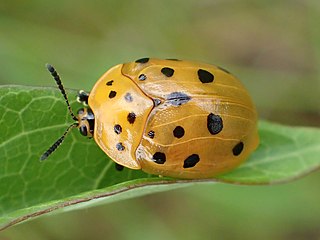
Spearmint, also known as garden mint, common mint, lamb mint and mackerel mint, is native to Europe and southern temperate Asia, extending from Ireland in the west to southern China in the east. It is naturalized in many other temperate parts of the world, including northern and southern Africa, North America, and South America. It is used as a flavouring in food and herbal teas. The aromatic oil, called oil of spearmint, is also used as a flavoring and sometimes as a scent.

Herring are various species of forage fish, mostly belonging to the family of Clupeidae.

The Encyclopedia of Life (EOL) is a free, online encyclopedia intended to document all of the 1.9 million living species known to science. It aggregates content to form "pages" for every known species. Content is compiled from existing trusted databases which are curated by experts and it calls on the assistance of non-experts throughout the world. It includes video, sound, images, graphics, information on characteristics, as well as text. In addition, the Encyclopedia incorporates species-related content from the Biodiversity Heritage Library, which digitizes millions of pages of printed literature from the world's major natural history libraries. The BHL digital content is indexed with the names of organisms using taxonomic indexing software developed by the Global Names project. The EOL project was initially backed by a US$50 million funding commitment, led by the MacArthur Foundation and the Sloan Foundation, who provided US$20 million and US$5 million, respectively. The additional US$25 million came from five cornerstone institutions—the Field Museum, Harvard University, the Marine Biological Laboratory, the Missouri Botanical Garden, and the Smithsonian Institution. The project was initially led by Jim Edwards and the development team by David Patterson. Today, participating institutions and individual donors continue to support EOL through financial contributions.
Elipsocidae is a family of Psocodea belonging to the infraorder Homilopsocidea. Members of the family have a free areola postica. Many species are apterous. The family includes about 130 species in more than 30 genera.

Noeeta is a genus of tephritid or fruit flies in the family Tephritidae.

Kateretidae also known as short-winged flower beetles are a family of beetles in the superfamily Cucujoidea. There are 10 extant and 4 extinct genera, and at least 40 described species. They are found worldwide except in New Zealand. Adults are anthophagous, feeding on flowers, while the larvae are spermatophagous inside the flower corolla.

Salpingidae or narrow-waisted bark beetles is a family of beetles in the superfamily Tenebrionoidea. The species are small, about 1.5 – 7 mm in length. The family is globally distributed and consists of about 45 genera and 300 species, which are generally found in the temperate regions of both hemispheres. The family is mainly associated with plants as well as with ascomycete and hyphomycete fungi. Some members of the family are associated with unusual habitats, like Aegialites and Antarcticodomus, which are found in coastal areas including the intertidal zone, with former feeding on algae.

iNaturalist is an American 501(c)(3) nonprofit social network of naturalists, citizen scientists, and biologists built on the concept of mapping and sharing observations of biodiversity across the globe. iNaturalist may be accessed via its website or from its mobile applications. iNaturalist includes an automated species identification tool, and users further assist each other in identifying organisms from photographs and even sound recordings. As of 9 July 2024, iNaturalist users had contributed approximately 197,660,888 observations of plants, animals, fungi, and other organisms worldwide, and 290,007 users were active in the previous 30 days.

Tekella is a genus of South Pacific araneomorph spiders in the family Cyatholipidae, and was first described by A. T. Urquhart in 1894.

Micropeza is a genus of stilt-legged flies in the family Micropezidae.

Chelymorpha cassidea, known generally as the Argus tortoise beetle or milkweed tortoise beetle, is a species of leaf beetle in the family Chrysomelidae. It is found in the Caribbean and North America.
Micropeza stigmatica is a species of stilt-legged flies in the family Micropezidae.
Trupanea bisetosa is a species of tephritid or fruit flies in the genus Trupanea of the family Tephritidae.

Micropeza lineata is a species of stilt-legged flies in the family Micropezidae.
Boettcheria bisetosa is a species of flesh flies in the family Sarcophagidae.
Boettcheria is a genus of flesh flies in the family Sarcophagidae. There are at least 20 described species in Boettcheria.
Animal Ethics is a nonprofit organization formed to promote discussion and debate around issues in animal ethics and to provide information and resources for animal advocates. They also do outreach work in several countries on the issue of speciesism. Their aim is to create a world where moral consideration is extended to all sentient beings. The organization's website covers topics such as speciesism, sentience, veganism and wild animal suffering and has content translated into several languages.
Noeeta bisetosa is a species of tephritid or fruit flies in the genus Noeeta of the family Tephritidae.
Tekella bisetosa is a species of Cyatholipidae spider endemic to New Zealand.










